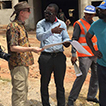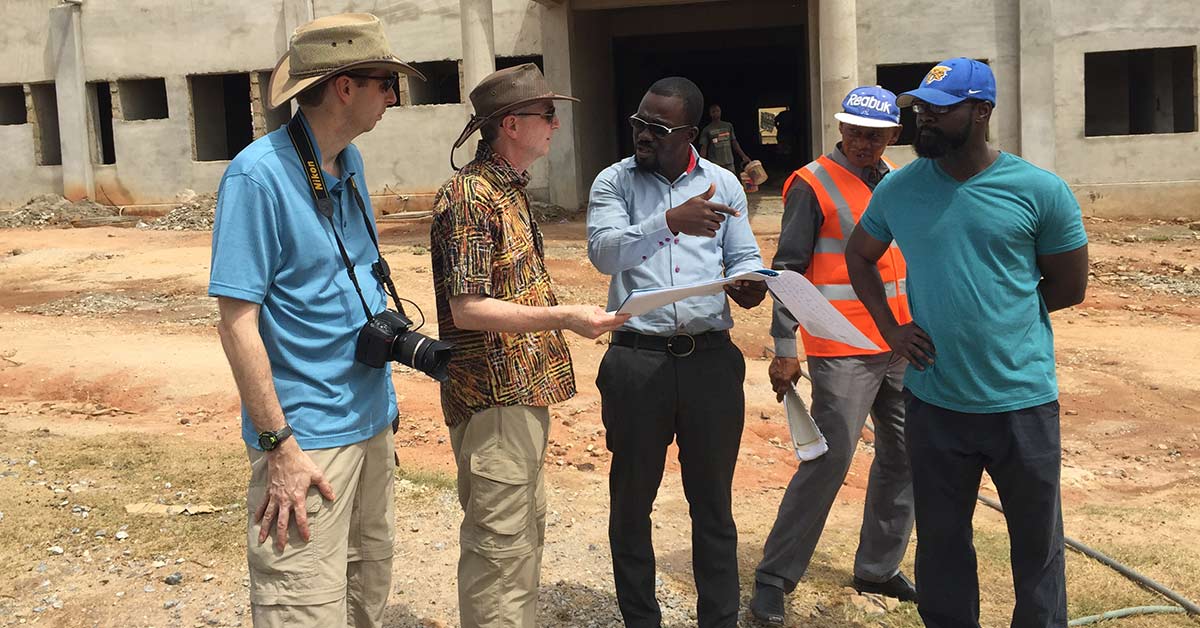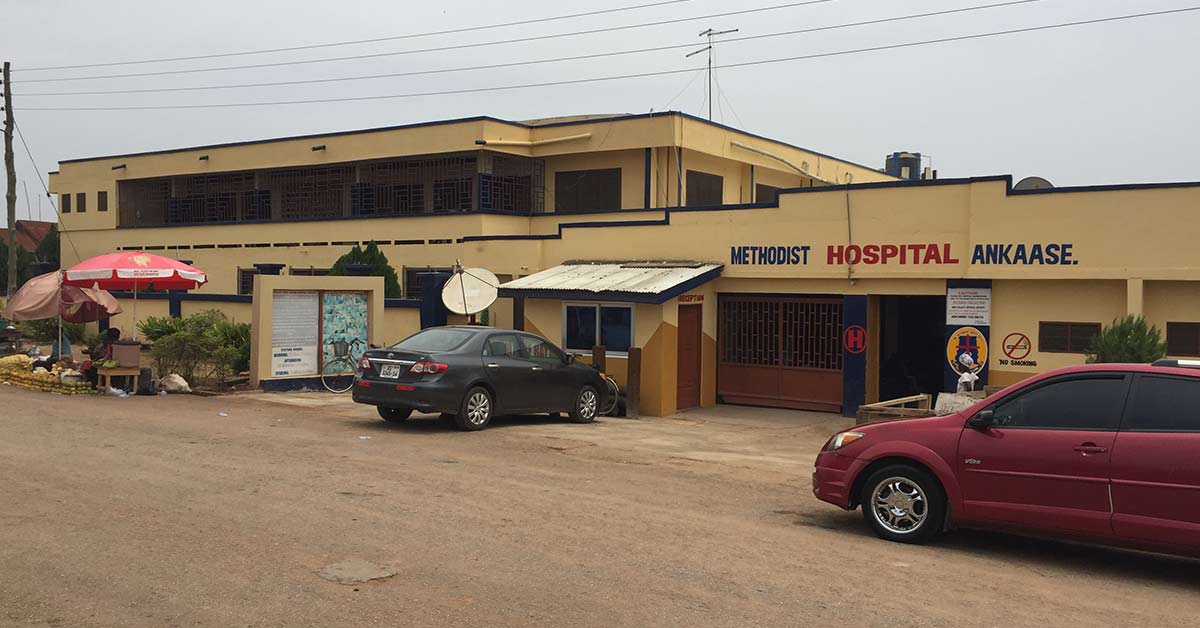Reflections on Locally Sustainable Healthcare
in Ghana, West Africa

|
Early in my missionary life as a physician, I was sent to help develop a hospital and medical ministry in Ghana, West Africa. In the process I became concerned about issues of sustainability and dependency. I was the first medical superintendent and full-time physician to serve at the rural Methodist Faith Healing Hospital in Ankaase, Ghana. People had prayed for many years that a doctor would come to lead the hospital. Local Ghanaians constructed the facility, and soon ownership transferred to the Methodist Church Ghana, who subsequently partnered with our mission agency in the USA. Much of the initial capital to develop the hospital infrastructure came from American churches that partnered with missionaries sent to serve alongside Ghanaian Christians. Ghanaian healthcare personnel, either volunteers or hired staff, provided the health services. Facility leadership, however, resided with two missionary couples over a period of seven or eight years. When they left - and after I completed my on-field language and culture training - I began my work at the hospital and accepted leadership responsibility under the Ghanaian church’s authority.
|
As I started my work, I began to realize how much would be needed to make a full-fledged hospital out of what was really a small basic clinic with only 12 staff. I also realized that this institution could either become a truly indigenous Ghanaian Christian hospital or it could become an American-influenced and supported medical center. It dawned on me that it all depended on our course of action. So I requested from my supporting mission agency some resources to better understand the issues. They recommended an eight-hour video series on dependency from World Mission Associates that my wife and I acquired and watched together. When we reflected on what we learned from the videos, we asked ourselves what we should be doing differently in the hospital and what we could continue as part of our ongoing incarnational approach to mission. That became a turning point with subsequent decisions to pursue the goal of attaining full funding and staffing from local resources in order to avoid dependency and promote local sustainability. Below I briefly describe three key things that we learned as we worked through what became an 18 year journey of collaboration with the Methodist Church Ghana. Our goal was to develop what has become an ever growing, 80-plus bed district hospital which is fully owned, funded and managed by Ghanaians providing quality physical and spiritual care to residents of their communities.
The following are a few observations to help understand how we got to where the hospital is today:
1) Local ownership and leadership are essential for sustainable and culturally relevant ministry.
We began efforts to encourage local sustainability by choosing to follow models and systems of organization and operation consistent with Ghanaian health authority standards. This included the formation of a hospital management team with mostly Ghanaian personnel from different departments and church representation, plus one or two missionaries. At first, the availability of well-qualified staff to lead departments was quite limited. As the hospital’s reputation for quality care grew, better-trained individuals were attracted to serve. Along the way, Ghanaians were placed in all levels of leadership. I noticed that whenever I left for furlough, Ghanaian staff stepped up to manage affairs, which was essential during the growing phase. Eventually, missionary leadership phased out in order for Ghanaian leaders to take over.
Sometimes a chosen leader did not perform well, resulting in low staff morale, poor healthcare, division or even hints of corruption. If this happened, the church stepped in to oversee operations and to exert strong action with prayer to appropriately navigate the cultural, political, social and emotional issues that arose. Ghanaians rather than missionaries were best at resolving these highly contextual issues. Consequently, the church’s strong involvement amidst occasional threatening challenges allowed it to make crucial decisions in finding acceptable, qualified leaders appropriate for the context.
2) Collaboration rather than control prioritizes cooperative relationships for ministry.
Collaboration implies working together shoulder to shoulder to fulfill agreed-upon goals. Control seeks to direct and dominate. Collaboration seeks to contribute and cooperate. Effective collaboration requires cultural sensitivity, for which mission organizations generally try to recruit and train. My own pre-departure, on-field and ongoing training contributed largely to my longevity in full time mission service and ministry. The case of Ankaase Hospital has shown that a mission organization is capable of collaborating effectively across cultures with local leadership involved in providing healthcare. Putting the emphasis on relationship and mutual cooperation rather than taking control and creating dependency can better achieve ministry goals. It requires a dying to self, as Jesus commanded and modeled. When we love Him and our neighbor, then God’s will is done and His kingdom advanced.
3) Long-term relationships build trust and respect.
Ministry is all about relationships. Sharing life together in community and building cross-cultural relationships over time is hard but rewarding work. My life in Ankaase treating patients, working with staff, meeting the Chief and elders, attending funerals and weddings, buying goods from traders, lending and borrowing tools, supporting church projects, relying on Ghanaian friends for advice or assistance to navigate life, helping with chores, learning language and culture and making decisions are all examples of life shared together. That is how discipleship happens. Working together created real-life opportunities to share with young men and women about biblical principles such as discovering Christ-like ways to handle problems and learning about forgiveness and redemption. Staying with a ministry calling through seasons of joy and sorrow, success and failure, celebration and suffering also builds lasting bonds of trust and respect. To this day that mutual trust has contributed to the endurance and growth of ministry through the Ankaase Hospital.

Sustaining healthcare ministry through collaborative cross-cultural relationships relies on strong local leadership and sharing life together. Sometimes this means sharing ideas, network contacts, and support for mutual ministry interests. It also means open and healthy communication, commitment, and cooperation. Healthy interdependence is a more fruitful association than dependence or even independence. My experience working closely for many years with Ghanaian and expatriate missionaries is that faithful obedience to God’s calling, a focus on His kingdom and putting others above oneself bears good fruit. There is a Ghanaian proverb that says, “He who climbs a good tree is helped upwards.” Our collaborative efforts to advance the Kingdom of God through healthcare and other mission endeavors has and will continue to bear fruit that lasts as we love one another, use our gifts, abilities and resources to engage the world for Christ and meet the needs of a broken and hurting world.
To God be the glory for all He has done.
What DNA Are We Passing on to the New Generation in Missions?
By Pastor Williams Phiri
Church Planter and Itinerant Missionary
Chipata, Zambia
When I was growing up as a young boy, I learned the value of hard work. I learned about self-reliance from my mother who managed her own small business and supported me as God led me into a traveling ministry as an evangelist and church planter and, eventually, as a missionary. I learned early on from experience that newly planted churches can be self-supporting, self-governing and self-reproducing. Later on when I was called to missions, I was never satisfied to depend on my church for support.
When I presented my calling to the church, I was told the church didn’t have money, so they recommended that I raise support from overseas, perhaps from the USA and Canada. This struck my heart, and I shared my concern with my mother and my sisters, believing that there would be a way to trust God for local resources. We all agreed that it could be done. My mother believed so much in God, and she was excited that I was going out as a missionary. I began by selling all my personal possessions, including my bicycle and my cell phone, so that I could reach out to the Yao Muslims in Malawi and Mozambique. Through my meager income from my own small business, I managed to plant churches in Malawi, Botswana and northern Mozambique.
Today, I am an itinerant missionary travelling throughout east, central and southern Africa. I have also been privileged to minister in Uganda, Tanzania, Brazil, Pakistan and Nigeria teaching the “DNA of self-reliance” — self-supporting and self-governing principles.
In our churches today in Africa, there is a basic assumption that local funds in the church are for the pastor’s salary, the church building and its “decorations” and maintenance of the property. Unfortunately, in many places in Africa there is a spirit of competition among the churches over who has the biggest church and who has the largest number of members, and yet they neglect missions. The church needs to wake up and see its mission.
Unhealthy dependency has paralyzed the African church’s efforts regarding world evangelization. The church feels intimidated when she thinks of this task, crippling even her ability to pray for the nations. This timid image needs to be dealt with if the church is to do her part in reaching the nations.
How can this be done? That will be a subject for another time. In the meantime, let us ask the Lord of the harvest to awaken a spirit of missions in the hearts and lives of all of us.
I welcome interaction with all who are interested in discussing issues of sustainability in the Christian movement. I can be reached at [email protected].









comments